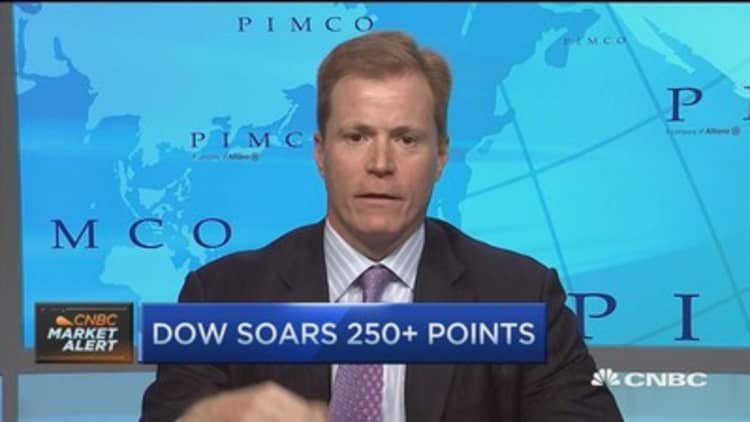
Friday's jobs report is another sign that interest rates are too low relative to the strength of the U.S. economy, Pimco's chief investment officer for global credit said on Friday.
The market is currently pricing the Federal Reserve's federal funds rate yield at 1 percent for the end of 2016 and 1.5 percent for 2017, Mark Kiesel said. The central bank has kept rates near zero since December 2008
"That's too low. The economy is going to pick up steam, and so we think the front end of the yield curve is vulnerable here," he told CNBC's "Fast Money: Halftime Report."
Read More Fed may be audience, not actor in rate hike: Portfolio Manager
Kiessel, who manages $300 billion of assets at Pimco, said the April report showing employers added 223,000 jobs for the month was very good and showed the U.S. consumer is picking up steam.
He ticked off a list of bright spots in the U.S. labor market: employment down 1 percent per year, job creation among 24- to -35-year-olds at a 15-year high, jobless claims at a 15-year low, and a million more job openings in the last year.
Paul Richards, UBS Head of forex for North America, told "Fast Money: Halftime Report" that if Kiesel is right about the economy then his levels are right, but he said he was concerned market watchers are too optimistic about the economy.
If weakness in the first quarter can be attributed to more than just poor weather, or if the United States has fallen back to 200,000 monthly average in payroll additions, the Fed may be hesitant to hike interest rates.
"I need more evidence, and I'm getting more and more concerned that something's gone wrong," he said. "Maybe it's the dollar. I don't know what it is, but the consumer is not acting the way I think they should be right now."
Kiesel said companies around the world are gradually raising prices, noting that the return of pricing power is evidence that the consumer is doing well.
"The reality is that if this unemployment rate keeps coming down at the pace it's coming down at—you only need 200,000 jobs a month to do it—you're going to see those wage gains pick up," he said.
Read More Should investors dump their bonds now?
U.S. Treasurys have recently fallen, weighed down by a global slide in government bond markets that is pushing yields to 2015 peaks. Benchmark 10-year Treasury yields neared 2.3 percent Thursday before closing at 2.184 percent.
Pimco is playing the bond market by owning cyclicals like corporate bonds, high-yield bank loans and non-agency mortgages, which are issued by private firms rather than government-sponsored enterprises such as Fannie Mae and Freddie Mac. At the same time, Pimco is underweight interest rate risk.
"We're playing the improvement in the economy," he said. "When you get higher interest rates you will get less supply coming in the corporate bond market, so usually when the economy improves, credit spreads tighten."


